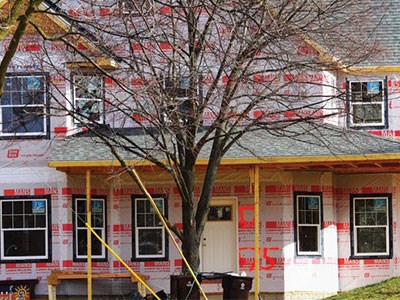Sudbury’s city council has imposed a two-year freeze on the fees it charges developers to help pay for infrastructure upgrades.
The freeze will leave a $2.6-million shortfall in the city budget, since revenue from a hike in the development charges was already included in revenue calculations in the coming years.
But with builders in Sudbury struggling, and some homes being built outside city limits to avoid the fees, councillors agreed to delay a 16 per cent increase for a couple of years, in hopes the market will bounce back.
The current rate for each single family home is $14,785, which will rise to $17,163 at the end of the five years. The rate for semi-detached homes will rise from $9,258 to match the rate for single homes, while the rate for apartment buildings will increase to $10,098 from $9,258 for each unit.
The development charges must be paid when the builder applies for a building permit. The money helps fund such projects as the south end rock sewer tunnel and a $60-million biosolids plant being built in the city’s west end.
The fees soared in 2009, rising from more than $3,000 per single family home to more than $14,000, but the city's housing market was red hot at the time.
Ward 10 Coun. Frances Caldarelli said the local market has cooled considerably, with those looking for homes opting to buy an existing one, rather than build new and pay the fees.
“In the last month I have seen more for sale signs in this city than I have ever seen,” Caldarelli said. “Maybe the market is changing.”
Ward 5 Coun. Ron Dupuis said when a new home doesn't get built, the city loses out on that tax revenue forever. Yet when developers want to build a subdivision, “we have dollar signs in our eyes” in anticipation of the fees they will collect.
Developers are also expected to pay other costs besides the charges, Dupuis said, such as putting in sidewalks and road improvements.
“If we increase the development charges to the point we want to do it — a 16 per cent increase — it means people will look at buying existing homes on the market rather than paying all these fees,” he said. “We're hearing it from every developer — the housing market is not what it was two or three years ago.”
Ward 11 Coun. Terry Kett pointed out that if the revenue doesn't come from development charges, it will have to come from taxpayers or through fee increases elsewhere.
“What are we going to ask the taxpayer to pay?” Kett wondered.
He agreed, however, that a review of their cost-sharing policies is needed, to ensure they're not putting an unreasonable burden on developers.
Mayor Marianne Matichuk also supported the freeze, saying the size of the proposed increase far exceeded what they would consider for property taxes.
“We don't increase our taxes that way, so a 16 per cent increase, that's not fair,” Matichuk said. “And if we don't get development, we don't get the money anyway.”
The bylaw will be approved at the city's next meeting, and will take effect by July 10. Exemptions for business improvement areas, such as the Flour Mill and downtown, are expected to be included in bylaw.




